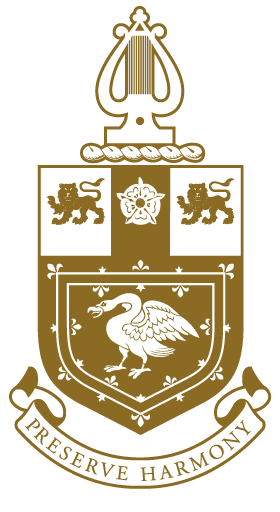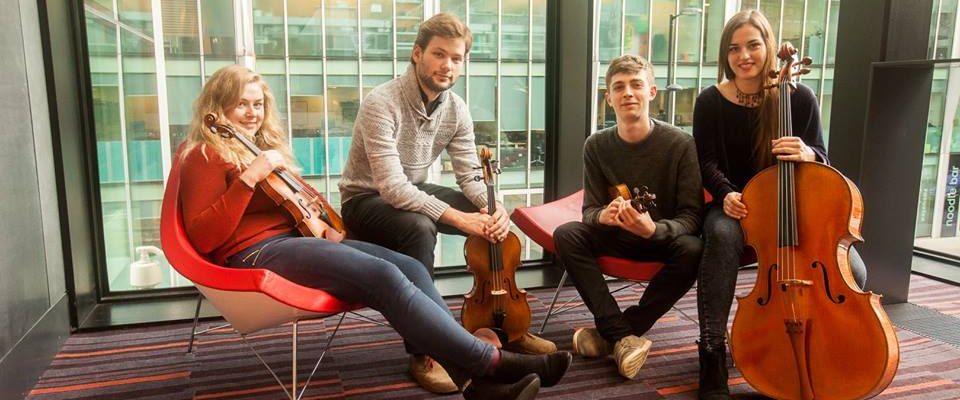Young Artist Interview: Jâms Coleman
I was born in North Wales and attended local primary and secondary schools on Anglesey, Ysgol Gynradd Llandegfan and Ysgol David Hughes. My mum sang in a local choir and had piano lessons from a local teacher. My brother started lessons when he was around six and when he started I wanted to learn too! Although there were no professional musicians in the home, music was central to what went on through my mum’s love of Schubert, my dad’s fondness of Bob Dylan and my brother’s endless perfecting of Guns N’ Roses in his room. Being a first language Welsh speaker, it was also natural for me to attend and compete at the local and national festivals (eisteddfodau) that took place all over the country. Alongside weekly piano lessons, my early musical experiences were shaped by membership of the local brass band, Seindorf Beaumaris Band. For my whole childhood it provided a regular and high-quality way of making music with other people. I moved from the Youth Band to Senior Band and also enjoyed many courses on the National Youth Brass Band of Wales and the National Youth Brass Band of Great Britain. Looking back at the hours spent at various band rooms, I remember a way of making music that had a sense of community at its core.
During my year out I took lessons on the violin and attended the Junior RNCM to study piano, conducting and singing. Having already completed my A-levels, I received an unconditional offer from the University of Cambridge and used the opportunity to make the most of all of the experiences I was being offered during this time.
When I arrived at university I started having lessons with Prof. Christopher Elton. A new world of sound, musicianship and colour were opened up to me in the first few lessons. In my second year, I also started lessons focusing on accompaniment and chamber music repertoire with Michael Dussek.
During my three years reading music at Girton College, Cambridge, I threw myself into all manner of different kinds of music making. I regularly sang services and complines in the chapel choir, organised and conducted orchestral concerts, played chamber music and had piano lessons in London all while trying to navigate through the demands of the academic course. I feel extremely fortunate to have attended Girton College as it had music at the heart of what was going on and world-renowned musicians were ready to make ideas come to life. This is where I was first introduced to song accompaniment and by the end of the three years I had explored and performed lots of repertoire including Schubert’s Winterreise and Schwanengesang with Nicholas Mulroy. He kindly gave me his time and opened my eyes to the possibilities and difficulties that lie in Schubert’s compositions. I also auditioned for various concerto opportunities and graduated having performed Beethoven’s Third, Fourth and Fifth Piano Concertos and Chopin’s Second Piano Concerto with various orchestras. This was a time when I could feel my development as a musician and pianist from performance to performance and where I felt free to try things out, to experiment and make music for the love of making music.
Some of the most moving performing experiences during this time were in the various college chapels where I discovered music that at the time was new to me. The music of Byrd, Tallis, Victoria and Schütz all came to life through singing one-per-part sung candlelit complines in the college chapel and through performances for larger forces with the university’s chamber choir. The music of Monteverdi was another huge discovery for me when singing in a vocal consort performance of Sestina and selected Madrigals from his fifth and sixth books. Aside from being introduced to wonderful music, this experience also offered me a place to develop an ear for collaborative music making through the natural give and take that this music demands.
In the summer following my graduation, I was the musical director and conductor for a Welsh language production of Tchaikovsky’s Eugene Onegin. The tour included fifteen performances in venues across Wales. I learnt huge amounts from this experience to do with the operatic rehearsal process, how to rehearse effectively and how to explore the challenges and rewards of performing the same work a lot in a short period of time. This experience also allowed me to get to know my homeland in a way that I had never done before.
I arrived at the Royal Academy of Music after the tour and started lessons and coaching. My first year was built around internal concerts and competitions as well as external engagements. At the Academy I was successful in winning many awards including the main award for accompaniment, the Brenda Webb Award. I returned to Cambridge to perform chamber music and two concertos, performed a recital of First World War repertoire with James Gilchrist and a recital of extracts from Wagner’s Der Ring des Nibelungen with Sir John Tomlinson. In my second year of university I had studied Wagner’s Ring Cycle and this marked the beginning of my love for this music. To be sat on stage two years later performing selections of Wotan with one of the greatest living singers was something I did not expect!
My first year was also when I started on the Oxford Lieder Young Artist Programme with baritone, Nicholas Mogg, a scheme which has been invaluable in offering a structure to our development by means of offering us a number of recitals in different venues spread over eighteen months. When Nick and I first started on the scheme we hadn’t been working together for very long but through regular recitals at various festivals we have grown in confidence and awareness of the challenges and rewards of song repertoire. I look forward to appearing with him again at future concerts for the Park Lane Group in London and for The Musicians’ Company and Concordia Foundation at Wigmore Hall in May 2017.
During my second year, I made my Wigmore Hall debut alongside colleagues from the RAM’s Song Circle, I performed another recital with James Gilchrist, performed a solo recital at the Three Choirs Festival and performed other chamber music and song recitals at the Ryedale, Fishguard and Roman River Festivals among others. I learnt a huge amount from my time studying at the Academy from my principal teachers but also from chamber music and vocal coachings. I am most grateful for support and awards from the Countess of Munster of Musical Trust, the Arts Council of Wales, the Martin Musical Scholarship Fund, the Elizabeth Evans Trust and the John Fussell Award that made this period of study possible.
Having graduated in July, this year I am a Piano Department Fellow at the Academy and have been introducing some of the younger undergraduate solo pianists to working with singers. Having learnt a great deal from a variety of different types of musical experiences and kinds of music making, I am keen to make this more of a possibility for other people. Far from becoming a ‘Jack of all trades’, this interest ensures that we as musicians are constantly fascinated by what we are engaging with and constantly learning about what it is to be a musician. As a pianist, I am lucky to be able to move between playing for instrumental and vocal coaching and can take a glimpse of the different ways in which different groups of musicians’ approach music. Moreover, I have learnt how this extends to different art forms. The wonderful Mandy Demetriou showed me how the physicality of a Baroque dance step is incorporated in the structure of the music of this time. I met Mandy while working for Samling Academy and although I struggled with some of the steps for the Charleston I am still keen to explore this interplay between movement and music. Any excuse to get out of the practice room!
I have enjoyed being a part of Samling Academy, an organisation that is encouraging singers from the North East. I saw more of the dialogue that exists in teaching and how we can learn new things from unexpected places. Growing up, both of my parents were teachers, my mother a local maths teacher and my father an education teacher at Bangor University. This background has given me a respect for the importance of teaching and giving people the chance to find their own individual voice in music and elsewhere.
The 2016/17 academic year brings many exciting opportunities including performing chamber music by Colin Matthews for the BBC Proms live on Radio 3, a concert of First World War repertoire with tenor Robert Murray in Prague, a return to the Oxford Lieder Festival, a solo performance live on S4C, an evening song recital at Wigmore Hall for The Musicians’ Company and solo recitals in France. There is much to look forward to and I am excited to meet new people and collaborate again with people I already know. I treasure the discursive element of my work and, in a world where competition can dominate, it is essential to me to find spaces where real and genuine engagement is the basis for the way I make music.





